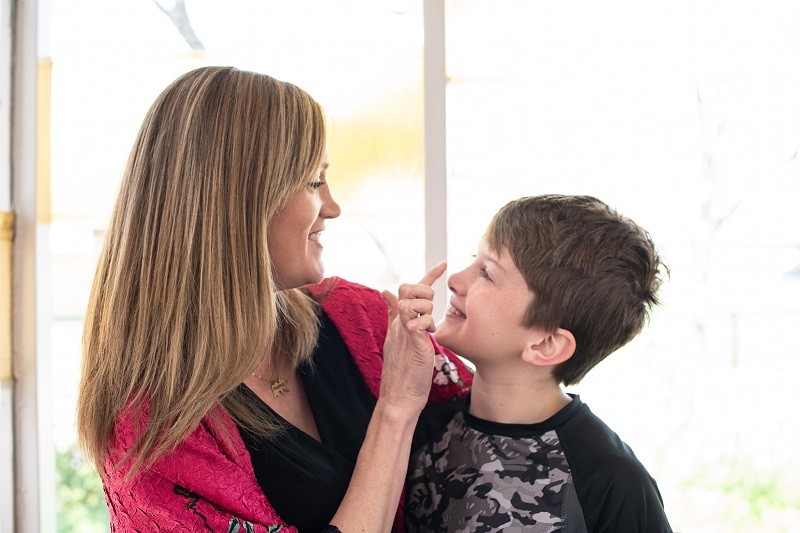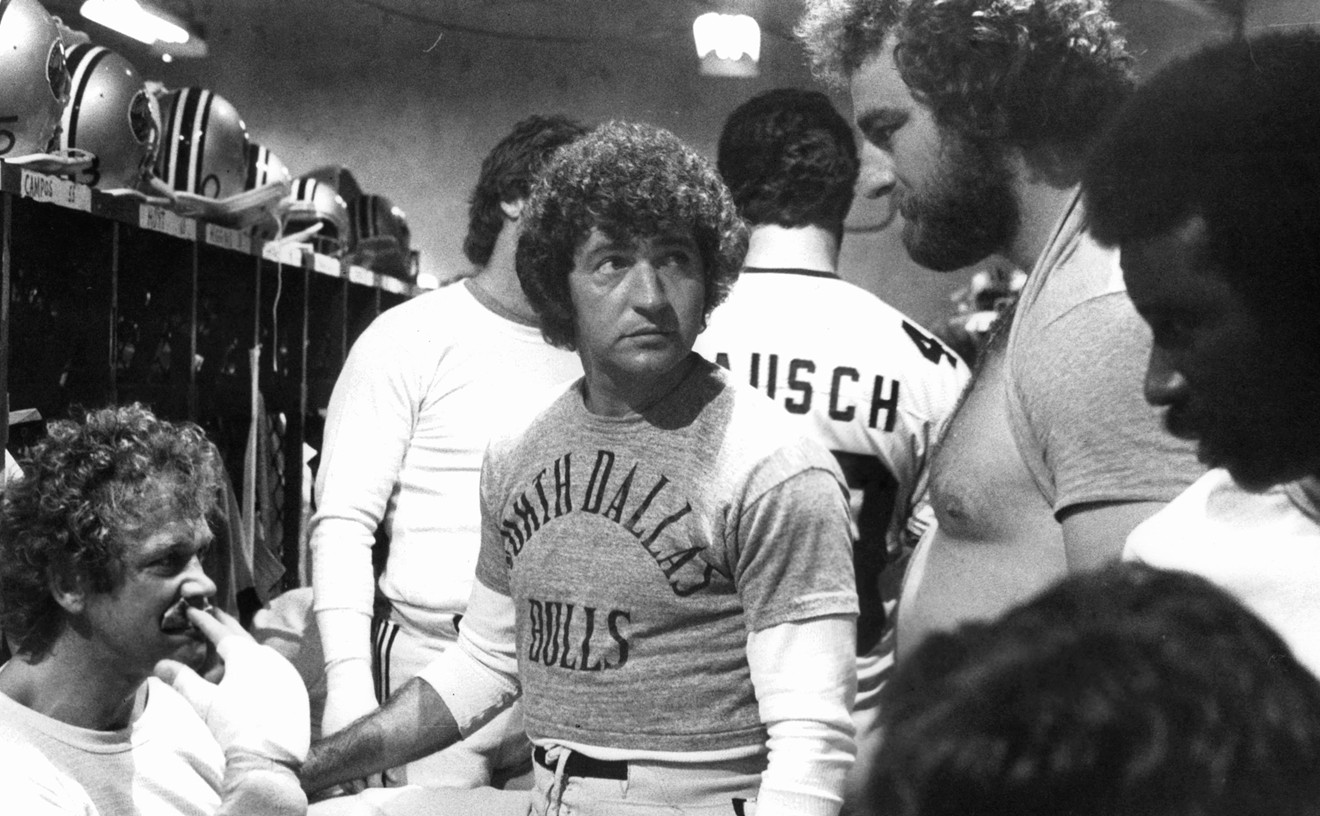One scene in Love to the Max perfectly captures the bizarre double existence of families with transgender children in Texas. While visiting a bookstore event showcasing children’s books with LGBT themes, the Briggle family of Denton is smiling, engaged, quiet, happy. Outside, a mob of shrill, hateful voices screams about groomers and child abusers.
Mother Amber holds onto a smile with the grim determination of someone sitting through a brief but painful medical procedure. She encourages her young daughter to hold her hand tight because nothing can hurt her if she’s with her mom. Her son, the titular Max, then 14, looks embarrassed by the outrage, but also resigned to listening to it in order to celebrate this moment in Texas.
Love to the Max makes its Texas debut this Saturday at the ThinLine Film Fest. Amber and Max have become the face of resistance to the anti-trans backlash in the state. In 2016, they famously invited Attorney General Ken Paxton to have dinner with the family. Paxton was in the middle of challenging trans-friendly school bathroom guidelines instituted by the Obama administration. Paxton attended, but walked away unchanged by the visit.
Six years later, authorities investigated the family for child abuse under a new Texas law against providing gender-affirming care for minors. That’s when documentarian Tanya Selvaratnam contacted Amber Briggle to cover her and Max’s struggles in a short film.
“I reached out with my support and encouraged her to document everything that was happening,” says Selvaratnam. “I like to shine a light on subjects that would otherwise go unnoticed. I told Amber, ‘You are making a difference.’”
Selvaratnam spent the summer with the Briggles, showing both the remarkable backlash against basic medical care for Max and the unremarkable life of a child happy with their gender identity. Max plays games, goes on picnics, rolls his eyes at his sister. It would be boring, if not for the fact that so much of the state’s legal apparatus wasn’t aimed at making his happiness impossible.
“They were like refugees in their own state,” says Selvaratnam. “Constantly threatened to be torn apart. I felt compelled to tell their story and bring people closer to their pain. I want them to see humans first, which is a big reason why I focused on the family and the emotions of the community rather than the politics of it.”
Paxton is noticeably absent from the story, as is the fact that this anti-LGBT backlash is almost exclusively driven by the Texas GOP. Selvaratnam made a conscious effort to omit this fact, hoping that it would keep otherwise sympathetic people from tuning out of the story.
Briggle is happy with the finished product of the film. She regrets exposing her family to the spotlight under their real names eight years ago, but embraces the fact that people from around the community have come to support her and other children like Max.
“Though the state has gotten more aggressive, the people in our lives have gotten far more accepting and more passionate about this fight,” she says. “They’re not fellow parents of trans kids They’re normies, cis-het couple with cis-het kids. I’ve seen how they continuously stand up and fight for families like mine. It gives me a lot of hope.
“[There were] a lot of positive things that came out of the dinner,” she continues. “We got more amplification. We didn’t change his mind, but a lot of people turned on Ken Paxton. He is just one man that works for us, and we collectively have more power than him and the douchecanoes in Austin.”
The pushback on gender-affirming care in Texas is not supported by any major national medical or scientific group. The American Medical Association, the American Psychiatric Association, the Federation of Pediatric Organizations and dozens of others all agree that gender-affirming care for minors is congruent with better mental health outcomes and greater overall happiness. Contrary to fearmongering claims, genital surgery is not performed on young children. Most changes are social, not surgical or pharmacological.
“The only difference with Max is a new name, pronoun, and the fact that he is one thousand percent happier,” Briggle says.
By showing the film at ThinLine, Selvaratnam hopes to bring the story of a typical family with trans children to a wider audience. She points out that other states such as Utah and Kentucky are using Texas as a template for their own laws.
“‘It’s disheartening, and it feels preventable,” she says. “I want to open people’s eyes to acknowledging the existence of trans kids and their right to feel safe and free.”
Love to the Max shows Saturday, April 27, at 5 p.m. at the Campus Theater in Denton. Tickets are free, but available only by registering for a festival pass. The film will also be released later this year as part of a documentary series by The New Yorker.

Audio By Carbonatix
[
{
"name": "Air - MediumRectangle - Inline Content - Mobile Display Size",
"component": "18855504",
"insertPoint": "2",
"requiredCountToDisplay": "2",
"watchElement": ".fdn-content-body",
"astAdList": [
{
"adType": "rectangle",
"displayTargets": "mobile"
}
]
},{
"name": "Editor Picks",
"component": "17105533",
"insertPoint": "4",
"requiredCountToDisplay": "1",
"watchElement": ".fdn-content-body",
"astAdList": [
{
"adType": "rectangle",
"displayTargets": "desktop|tablet"
},{
"adType": "rectangle",
"displayTargets": "desktop|tablet|mobile"
}
]
},{
"name": "Inline Links",
"component": "18349797",
"insertPoint": "8th",
"startingPoint": 8,
"requiredCountToDisplay": "7",
"maxInsertions": 25
},{
"name": "Air - MediumRectangle - Combo - Inline Content",
"component": "17105532",
"insertPoint": "8th",
"startingPoint": 8,
"requiredCountToDisplay": "7",
"maxInsertions": 25,
"watchElement": ".fdn-content-body",
"astAdList": [
{
"adType": "rectangle",
"displayTargets": "desktop|tablet"
},{
"adType": "rectangle",
"displayTargets": "desktop|tablet|mobile"
}
]
},{
"name": "Inline Links",
"component": "18349797",
"insertPoint": "8th",
"startingPoint": 12,
"requiredCountToDisplay": "11",
"maxInsertions": 25
},{
"name": "Air - Leaderboard Tower - Combo - Inline Content",
"component": "17105535",
"insertPoint": "8th",
"startingPoint": 12,
"requiredCountToDisplay": "11",
"maxInsertions": 25,
"watchElement": ".fdn-content-body",
"astAdList": [
{
"adType": "leaderboardInlineContent",
"displayTargets": "desktop|tablet"
},{
"adType": "tower",
"displayTargets": "mobile"
}
]
}
]











